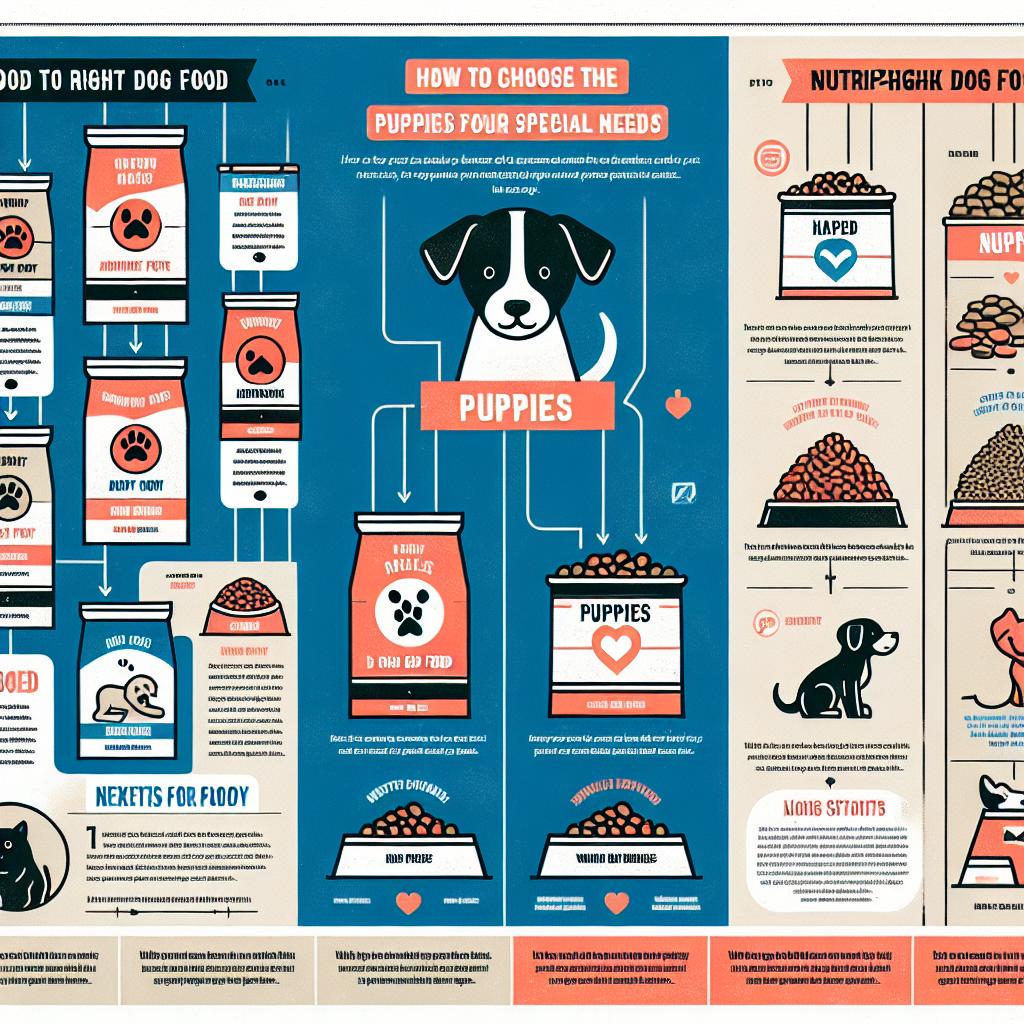Bringing a puppy into your home is an adventure filled with joy, laughter, and the occasional mess. As you embark on this journey, one of the most important decisions you’ll face involves your pup’s nutrition—especially if your furry friend has special needs. Just like humans, puppies come with their own unique requirements that can significantly influence their growth and development. Selecting the right dog food can be a daunting task, with a plethora of brands, formulations, and dietary options available on the market today. This guide will help you navigate the complexities of puppy nutrition, shedding light on how to choose the best food tailored to your puppy’s individual needs. Whether your puppy is dealing with allergies, sensitivities, or specific health concerns, understanding the essentials of canine nutrition can ensure your best friend thrives in their formative years. Let’s dive in and discover the key considerations that will lead you to the perfect recipe for a healthy, happy puppy!
Understanding the Nutritional Requirements of Special Needs Puppies
Understanding the nutritional needs of puppies with special requirements is crucial for their health and development. These puppies often face unique challenges, such as allergies, developmental delays, or metabolic disorders, which necessitate a tailored diet. When choosing food, consider the following components of their diet:
- High-quality protein: Essential for growth and muscle development.
- Essential fatty acids: Important for brain and eye development.
- Vitamins and minerals: Needed to support overall health and immune function.
- Digestible carbohydrates: Provide energy while being easier on sensitive stomachs.
Furthermore, it’s valuable to determine the appropriate caloric intake and portion control, tailored to the particular needs of your puppy. For instance, a table can help simplify dietary guidelines:
| Special Need | Recommended Nutritional Focus |
|---|---|
| Food Allergies | Limited ingredient diet, hypoallergenic options |
| Puppies with Growth Disorders | Higher protein and calorie counts |
| Joint Issues | Omega fatty acids, glucosamine supplements |
| Metabolic Disorders | Low-fat diets, controlled carbohydrates |
Always remember to consult with a veterinarian to ensure that your puppy’s diet is well-balanced and meets their specific needs, as individual requirements may vary.

Identifying Common Health Concerns and Their Dietary Solutions
When selecting the best diet for puppies with special needs, it’s essential to recognize the most common health concerns they might face. Issues such as allergies, joint problems, and digestive sensitivities often require targeted dietary approaches. By doing a thorough evaluation of your puppy’s condition, you can select a diet that supports their unique requirements. For example, if your puppy suffers from food allergies, look for formulas that utilize limited ingredient diets to minimize exposure to common allergens. Incorporating ingredients like sweet potatoes, salmon, and chickpeas can provide essential nutrients without triggering allergic reactions.
Another point of consideration is boosting overall health with additional supplements targeted at specific issues. For instance, if your puppy needs support for their joints due to growth spurts or genetic predispositions, incorporating omega-3 fatty acids can be beneficial. Additionally, probiotics can aid in enhancing digestion for puppies with sensitive stomachs. Below is a simple table outlining common health concerns and corresponding dietary solutions:
| Health Concern | Dietary Solution |
|---|---|
| Allergies | Limited ingredient diet with novel proteins |
| Joint problems | Omega-3 supplements and glucosamine |
| Digestive sensitivities | Probiotic-rich foods and high-fiber options |

Reading Labels: Decoding Ingredients and Nutritional Information
When selecting the appropriate dog food for puppies with special needs, it’s essential to become a savvy label reader. Understanding the ingredients and nutritional information can help you make informed choices that cater to your puppy’s unique requirements. Begin by examining the ingredient list; ingredients are typically listed in descending order by weight. Look for high-quality protein sources such as chicken, lamb, or fish as the first ingredient, as these are vital for your puppy’s growth and development. Avoid foods that contain vague terms like ”meat by-products,” or those laden with fillers like corn and soy, which may provide little nutritional value.
Equally important is the nutritional analysis typically found on the bag or can. Pay attention to the crude protein, fat, fiber, and moisture percentages to ensure the food meets your puppy’s specific dietary needs. For example, a high protein percentage is crucial for active puppies, while lower fat content may benefit those with weight management issues. Additionally, consider the presence of added vitamins and minerals, as these contribute to overall health. Here’s a quick reference table to help decode common nutritional components:
| Nutrient | Importance |
|---|---|
| Crude Protein | Supports muscle development |
| Crude Fat | Provides energy and supports skin/coat health |
| Crude Fiber | Aids digestion and maintains gut health |
| Moisture | Ensures hydration |

Consulting with Veterinarians for Tailored Feeding Plans
When it comes to crafting a feeding plan for puppies with special needs, consulting with veterinarians is essential. Veterinarians possess the expertise to assess your puppy’s unique requirements, whether they stem from medical conditions, allergies, or developmental concerns. By engaging in a detailed discussion with a vet, you can uncover vital information about your puppy’s nutritional needs, including specific dietary restrictions that may influence the choice of food. The tailored advice your veterinarian provides can lead to the selection of high-quality ingredients that not only support growth but also enhance overall well-being.
During your consultation, consider addressing the following key points to ensure a comprehensive feeding plan:
- Medical History: Share any past or current health issues that could impact dietary choices.
- Age and Development: Discuss your puppy’s growth stage to determine caloric and nutritional needs.
- Allergies/Sensitivities: Identify any known food allergies that may require specific formulations.
- Activity Level: Understand how exercise influences your puppy’s energy requirements.
Additionally, many veterinarians can recommend specialized dog food brands that cater to puppies with distinct needs. These products may include:
| Brand | Specialization |
|---|---|
| Hill’s Prescription Diet | Weight management |
| Royal Canin | Breed-specific nutrition |
| Merrick | Grain-free options |
| Blue Buffalo | Limited ingredient diets |
By collaborating closely with your veterinary professional, you can ensure that your puppy receives the most beneficial and appropriate diet, setting the stage for a healthy and vibrant life.
Q&A
Q&A: How to Choose the Right Dog Food for Puppies with Special Needs
Q1: What does it mean for a puppy to have special needs?
A1: A puppy with special needs could refer to various conditions that require tailored care—this may include health issues like allergies, digestive sensitivities, orthopedic problems, or developmental delays. Special needs puppies might require specialized nutrition to support their growth, immune function, or specific health concerns.
Q2: Why is choosing the right food particularly important for these puppies?
A2: Proper nutrition is the foundation of a healthy life, especially for puppies with unique requirements. The right dog food can aid in managing their condition, promoting growth, ensuring optimal development, and preventing further health complications. A well-balanced diet can make all the difference in enhancing their quality of life.
Q3: What should I look for in a puppy food formula?
A3: Look for high-quality ingredients, especially in the first few listed items. A good puppy food should have real meats or meat meals, whole grains, vegetables, and essential fats. Pay attention to the nutritional adequacy statement on the packaging, which confirms that the food meets the standards set by the Association of American Feed Control Officials (AAFCO) for puppies.
Q4: Are there specific ingredients or nutrients that are particularly beneficial for special needs puppies?
A4: Yes! Omega-3 fatty acids are great for promoting healthy skin and coat, while probiotics can help with digestive issues. For puppies with joint problems, glucosamine and chondroitin can provide support. Furthermore, specific vitamins and minerals like calcium and phosphorus are essential for bone growth and development.
Q5: How can I identify if my puppy’s current food is appropriate for their needs?
A5: Monitor your puppy for any signs of discomfort, such as bloating, vomiting, excessive itching, or lethargy. A shiny coat, regular bowel movements, and consistent energy levels are indicators that the food suits them well. If your puppy is experiencing health issues, consult with your veterinarian to determine if a food change is necessary.
Q6: Should I consider any specific brands for special needs puppies?
A6: While many brands offer specialized lines, it’s crucial to choose a reputable brand known for producing high-quality puppy food. Look for pet foods formulated for specific health needs, such as hypoallergenic diets or foods designed for digestive support. Your veterinarian can also provide recommendations based on your puppy’s unique circumstances.
Q7: Is it okay to switch puppy foods, and how should I do it?
A7: Yes, it’s absolutely okay to change your puppy’s food, especially if their needs change due to health reasons. When making the switch, do so gradually over 7 to 10 days to prevent digestive upset. Start by mixing a small amount of the new food with the current food, slowly increasing the amount of new food each day until the transition is complete.
Q8: How often should I consult with my veterinarian regarding my puppy’s diet and health?
A8: Regular consultations are essential, especially if your puppy has special needs. Initial discussions about diet should be part of your vet visits, typically within the first few months. As your puppy grows and their needs evolve, routine check-ups can help monitor their health and make necessary adjustments to their diet.
Q9: Are there any common misconceptions about feeding special needs puppies?
A9: A common misconception is that all puppy foods are created equal. Some believe that costlier brands are automatically better, which isn’t always the case. It’s important to read ingredient lists and consult professionals rather than relying solely on price. Additionally, some owners may think they can rely on homemade diets—but this can lead to nutritional deficiencies without proper guidance from a vet.
Q10: What final tips can you share for responsible puppy feeding?
A10: Stay informed! Research your options, read reviews, and consult your veterinarian to ensure you’re making the best choices. Emphasize quality over quantity when it comes to ingredients, and always monitor your puppy’s response to any dietary changes. Remember, every puppy is unique, and the right food can pave the way for a happy, healthy life!
To Wrap It Up
selecting the right dog food for puppies with special needs is a journey that requires thoughtful consideration and a touch of compassion. By understanding the unique dietary requirements of these young companions, you can foster their health and happiness from the very start. Remember to consult with veterinarians, explore high-quality ingredients, and remain adaptable to your puppy’s changing needs. The right nutrition is not just about sustenance; it’s about nurturing a bond that will flourish over the years. As you embark on this rewarding path, may you find joy in every wag of their tail and every playful bark. After all, a well-nourished puppy is a happy puppy, ready to take on the world by your side.

